- Home
- Richard Lee Byers
The Captive Flame: Brotherhood of the Griffon • Book 1 Page 5
The Captive Flame: Brotherhood of the Griffon • Book 1 Read online
Page 5
“I repeat,” said Zan-akar, “we have witnesses.”
“Where?” replied Perra. “Not anyplace that Her Majesty or anyone else impartial can question them, apparently. Let’s be rational. If companies of dragonborn warriors were crossing Chessenta, then some of her own people would have noticed. Akanûl wouldn’t need to tattle on us.”
“Western Chessenta is sparsely populated,” Zan-akar said, “and the hills and gullies offer excellent cover. Tymanther could sneak a whole army through.”
“Be that as it may, my lord,” said Perra, “since you didn’t bring any witnesses along with you today, in the end, this matter simply comes down to Akanûl’s word against ours.”
“Perhaps I’ll send for the witnesses,” the stormsoul said, with such malevolent assurance in his tone that for just a moment, Balasar wondered if rogue dragonborn might actually have committed the alleged atrocities. “Meanwhile, I’m more than willing to discuss which kingdom’s word a sensible person ought to trust.”
Perra snorted. “Surely you aren’t going to suggest that the genasi’s reputation for honesty and steadfastness compares favorably to that of the dragonborn.”
“What I’m saying,” Zan-akar replied, “is that since the day we arrived in Faerûn, Akanûl has been purely and unequivocally a friend to Chessenta. Tymanther claims to be her ally, but you also profess the same to High Imaskar. The same degenerate horde of wizards and slave-takers currently sacking villages along the Chessentan coast and sinking her ships up and down the length of the Alamber Sea.”
For once, Perra seemed at a loss, at least momentarily, and Balasar didn’t blame her. Zan-akar, damn him, had landed a shrewd stroke. The war hero had made no secret of the fact that she resented Tymanther’s continued friendship with High Imaskar.
Maybe the dragonborn should pick a side. Or maybe Balasar simply thought so because at heart he was more a fighter than a diplomat. A person could certainly make a case that when a realm only had two allies, it would be a mistake to relinquish either.
“When you put it that way,” drawled Aoth, “the choice seems clear. But actually, Majesty, Lord Zan-akar is claiming a difference where none exists.”
“What do you mean?” Shala asked.
“I spent the first part of last year working for the Simbarchs,” the sellsword said, “and Aglarond and Akanûl are friends. So there were genasi hanging around Veltalar. I didn’t make any special effort to pry into their affairs, but I didn’t need to in order to hear that not long ago, the queen of Akanûl forged an alliance with High Imaskar. It’s no secret—except, evidently, when Lord Zan-akar and his associates are talking to you.”
Zan-akar smiled contemptuously, although the space in which he stood darkened a little more. “At a moment like this, it’s good to know that Her Majesty is far too shrewd to heed the forked tongue of a mage.”
Shala glared at him. “Is the sellsword lying? Answer honestly! You know I can find out the truth for myself.”
Zan-akar hesitated, then said, “Majesty, you know as well as I that the ministers of a realm receive envoys from here, there, and everywhere. I believe that Akanûl has talked to High Imaskar, and possibly even worked out an arrangement or two regarding trade. But nothing that compromises our friendship with Chessenta!”
“Go,” Shala rapped. “Diplomats, counselors, the lot of you. We’ll take up your spite and accusations another day, when I’m in firmer control of my temper.”
It seemed to Balasar that thanks to Aoth, Tymanther had at least held its own in the battle of words, so that made two debts Clan Daardendrien owed the sellswords. As they all filed out, he caught the Thayan’s eye and gave him a respectful nod. Aoth responded with a smile that, though cordial enough, came with a certain sardonic crook.
* * * * *
Khouryn combed through Vigilant’s bronze and white plumage, checking for broken feathers and parasites with the two-tined iron fork designed for the purpose. Smelling of both bird and musky hunting cat, the griffon lay flat on the stable floor so the dwarf could reach all of her. In fact, she looked like she’d melted there. The grooming had produced a state of blissful relaxation.
“It sounds like everything went all right,” Khouryn said.
“Maybe,” Aoth replied. He’d already finished with Jet’s aquiline parts and started brushing his fur, first against the grain and then with it. The black steed’s eyes were scarlet slits. “But I hate talking to zulkirs—or lords or whatever—and getting mired in their lies and intrigues.”
Khouryn worked his way along Vigilant’s limply outstretched wing. “Such is the lot of a sellsword leader. But I don’t blame you. I’m not even sure I understand, from your account, what the palaver was fundamentally about.”
“Nor do I. The brawl? Our presence in Luthcheq? Some rivalry between our employer and Lord Luthen? The hatred between Akanûl and Tymanther? Or between Chessenta and High Imaskar? Take your pick. It was all tangled up together.”
Khouryn spotted a nit lurking at the base of a feather. He set down the fork, took up his tongs, pulled the larva out, and crushed it. “Why do all these people despise one another anyway?”
“Aside from recent transgressions, you mean? As I understand it, everything goes back a long way. The dragonborn and genasi fought when they lived wherever it is they used to live. When the Spellplague scooped them up and dumped them in Faerûn, they brought their quarrel along with them.”
“Now, the Chessentans,” Aoth continued, “started out as slaves of the old Imaskari Empire. Who were notable wizards, which accounts for the Chessentan hatred of magic. I’ve heard the new realm of High Imaskar isn’t really the same animal as the old one. It doesn’t keep slaves, for example. But the name is more or less the same, the people look the same, they have the same gift for sorcery, and that’s close enough to stir up the Chessentans. They’ve been poking at the new Imaskari since the latter first announced their presence to the world. You could actually argue that the current ‘piracy’ is justified retaliation, although I wouldn’t say so to the locals.”
“In other words,” said Khouryn, “it’s all stupid.”
“Well, of course you’d think so. Who ever heard of a dwarf holding a grudge?”
Khouryn strained unsuccessfully to stifle a chuckle. “Fair enough. It’s simply that there’s something to be said for fighting in a righteous cause.”
Aoth swished his brush down the length of Jet’s tail. “We did that in Thay and again in Impiltur, and look at the shape we’re in.”
“I recognize it’s a luxury, not a necessity. Still, it would be nice if those eyes of yours had given you some insight into why Nicos and Luthen are at odds, or whether Zan-akar was telling the truth about anything.”
The Spellplague had done more than extend Aoth’s years. It had sharpened his sight to a preternatural degree. He could see in the dark and perceive the invisible. No illusion could deceive him. On rare occasions, he even saw hints of a man’s true character or intentions, or portents of the future.
Aoth hesitated, scowled, and then said, “To be honest about it, when I first met Nicos, I glimpsed the form of a green dragon.”
“What? What does that mean?”
“I have no idea. We can be reasonably sure there’s no big green dragon living in Luthcheq, so it must have been symbolic, which is another way of saying it could have meant any damn thing. Maybe just that my three lieutenants were going to get involved with a couple of dragonborn.”
Khouryn tilted his head. “You talk like you didn’t even bother to think about it. Since when do you discount the value of information, no matter how cryptic? How many times have I heard you say, ‘Collect all the facts you can; any one of them could mean the difference between victory and defeat’?”
“In the field, yes. At a royal court, it’s different. Knowing people’s secrets is dangerous, and so is meddling in their business. In retrospect, I feel stupid for telling the war hero that Akanûl has ties to High Imaskar. I spok
e without thinking.”
“You may have earned a measure of her trust. Or gratitude.”
Aoth grunted. “I suspect it takes more than that, and I certainly made an enemy of Zan-akar. All the more reason to keep our heads down, play constable with as little fuss as possible, and then head out to fight Threskel or the Imaskari as soon as Shala will allow it.”
T
W
O
18–29 CHES, THE YEAR OF THE AGELESS ONE (1479 DR)
With his mail, shield, spear, and other weapons, Aoth looked like a warrior and had hoped the citizens of Luthcheq would take him for that and nothing more. But almost immediately they’d started whispering behind his back and making signs to avert the evil eye. He suspected that Luthen or Zan-akar had put out the word that he was actually a war-mage.
He stopped leading foot patrols thereafter. No point agitating the locals more than they were already. Instead, he and Jet had taken to monitoring the city from the sky.
An easterly wind carried them to the religious quarter, where the gilded dome of the temple of Waukeen, goddess of trade, gleamed at one end of a mall. At the other stood the colonnaded house of Amaunator, lord of the sun, with an enormous sundial out in front.
Drumming and chanting, Tchazzar cultists paraded past the instrument. Some carried crimson banners. Others had combined forces to animate a dragon made of red cloth. Capering inside it, they made it weave back and forth in serpentine fashion.
At first no one seemed to mind. Then half a dozen priests in yellow robes strode forth from Amaunator’s temple. The stout sunlord in the lead, his vestments trimmed with gold and amber, started haranguing the marchers.
“Fly lower,” said Aoth. “Let’s hear what he’s saying.”
Jet swooped and set down on the roof of the Red Knight’s house, a comparatively small box of a building that, with its battlements and barbican, looked more like a fortress than a shrine. Aoth hoped the patron of strategists would forgive a fellow commander the intrusion.
Nobody mortal appeared to notice his descent. The sun priests, and the dragon cultists’ reaction to them, had already captured everyone’s attention.
“Dragons aren’t gods!” insisted the chief sunlord, his voice raised so everyone could hear. “And your display, in these sacred precincts, is an affront to the true gods!”
“Tchazzar saved his people,” replied the skinny adolescent girl at the head of the procession. She’d daubed scarlet symbols on her forehead and cheeks, and had a fervid, feverish cast to her expression. Someone had given her a fine vermilion mantle to throw on over the shabby garments beneath. “He also rose from the dead. That’s what gods do. And now that we need him, he’ll come back again. We only have to believe.”
“Child, you don’t understand these matters. You can’t. You lack the education.”
“I’m glad. Because I see that all learning does is blind you to the truth.”
The high priest took a breath. “Put your faith in the Keeper of the Yellow Sun and the other powers of light. And in the war hero they’ve appointed to rule us. That’s who will save you.”
“When?” called a man with a pox-scarred face. “Threskel and High Imaskar and the filthy wizards are destroying us! What are your gods and Shala Karanok waiting on?”
“Perhaps,” the cleric said, “they’re waiting for their people to stop behaving in a manner that’s both blasphemous and treasonous.”
The marchers shouted back, jeering at him.
“My children,” said the priest, “I tried to counsel you. As you refuse to heed me, I’ll have to resort to more drastic measures.”
He beckoned for the lesser sunlords to gather in. A couple hesitated or looked alarmed, but they all obeyed. Their master started chanting, and they joined in.
“They’re not,” said Jet in disbelief.
But apparently they were. Trying to perform some ritual of chastisement with the targets standing unrestrained just a few strides away. Did they imagine Tchazzar’s worshipers would simply wait idly for them to finish?
If so, they were doomed to disappointment. The thin girl—the cultists’ prophetess, apparently—shrilled, “Stop them!” She lunged forward, and the marchers surged after her.
Jet perceived what Aoth wanted through their psychic link, or else he simply recognized himself what was required. As he sprang into the air, he gave a screech that froze some of the folk below in their tracks. Aoth pointed the long spear that served him both as warrior’s weapon and mage’s staff, rattled off words of command, and cast a wall of leaping, crackling yellow flame between the cultists and the priests. That brought the rest of the rushing men to a sudden, stumbling halt. It startled the sunlords into falling silent too.
Then Jet made a couple of low passes over the crowd, like he was deciding whom to snatch up in his talons and devour. Scowling, Aoth tried to look equally intimidating.
When he judged that their little pantomime had done as much good as it was likely to, he had the griffon land on top of the sundial. Evidently it was just his day to take liberties with the property of the gods.
“Captain!” called the chief sunlord.
Aoth dismounted. “If anyone makes a move,” he said, ostensibly to Jet but loud enough for everyone to hear, “kill him!” The griffon crouched and glared as if he’d like nothing better than to pounce over the blazing barrier and down into the marchers. Aoth then strode to the edge of the sundial and looked down at the man who’d hailed him.
“I’m Daelric Apathos,” said the sunlord, “steward of the Keeper’s house. Thank you for holding back the rabble.”
To Aoth, the fellow sounded more stiff than grateful, but it seemed best to take the statement at face value. “That’s why I’m here, Sunlord. To keep the peace.”
“Hold them back for a few more moments, and my clergy and I will complete the malediction.”
“That won’t be necessary.”
Daelric blinked. “I assure you, I only intend a mild rebuke. It won’t be that much worse than the average sunburn.”
“And I assure you, if you start praying again, I’ll snuff the fire, climb back on my griffon, and leave you and the Church of Tchazzar to sort things out for yourselves.”
The high priest sneered. “I should have known better than to expect piety from one of your kind. The war hero will hear how you denied me in my hour of need.”
“I bet she will.” Aoth paced to the front of the sundial. Peering out across the wall of hissing flame, still burning hot and bright with no fuel but magic to sustain it, he located the prophetess. “As long as I’m collecting names, I may as well get yours.”
She drew herself up even straighter, as though to assert that she wasn’t afraid. “Halonya.”
“Well, Halonya, you and your friends go march somewhere else.”
“It’s our city as much as it is that priest’s. We have the right to walk the street. Any street, including this one.”
“I’m an officer of the watch, which means you have the right to walk where I say. Now go, or the next fires will drop right on your heads.”
Halonya held his gaze for another moment, then nodded curtly. She pivoted and started to lead her fellow cultists away. They followed, but not without some glaring, spitting, and obscene gestures to demonstrate their dislike of Aoth.
The sunlords were more restrained about it. But their stony faces conveyed the same sentiment.
“This is nice,” said Jet. “At least they agree on something.”
* * * * *
Gaedynn spotted three lights shining close together in the dark street below. He sent Eider, his griffon, named for a love of swimming unusual among her kind, swooping lower.
The lanterns belonged to a patrol, but not one of the Brotherhood’s. The men were locals. Their lights revealed an eviscerated corpse. A circle of spectators, some in their nightclothes, had assembled to gawk at it. A couple cried out when Eider touched down. The griffon gave them a disgusted look.
Gaedynn looked for the sergeant in charge. That appeared to be a blunt-featured man who was evidently putting on weight, since even with the bottom buckles left unfastened, his leather cuirass was too tight for his flabby body. His face pale in the lantern light, swallowing repeatedly, he stood and stared at the dead body.
“When did this happen?” Gaedynn asked.
The pudgy man shook his head. “Who knows?”
Gaedynn stooped to examine the remains. He’d spent most of his youth as a hostage among the elves of the Yuirwood. It had been an alarming experience at times, particularly when his father’s continued misbehavior made his captors think they really ought to kill him in retaliation, or what was the point of having a hostage in the first place? But it had taught him woodcraft, and to him it looked like claws rather than a blade had ripped the victim. Which didn’t necessarily mean that a human wasn’t responsible for the crime.
Gaedynn rose and waved a hand at the gawkers. “Have you questioned them?”
“If any of them had seen the murderer, they’d be dead too.”
“Not if the killer didn’t see them,” Gaedynn said. “Now, have you questioned them?”
“No.”
“Well, someone should start, or at least make sure no one wanders off. The rest of us need to try to pick up the killer’s trail. I’ll look from the air …” He belatedly noticed the watchman’s scowl. “What’s wrong?”
“Maybe your flying beasts and fancy gear impress Nicos Corynian. But you’re no better than us, and we don’t take orders from you.”
“My friend, I realize I’m not your commanding officer, and I would never presume to tell you how to proceed, except that you don’t appear to be proceeding. And how will that look when you report to those who do command you?”

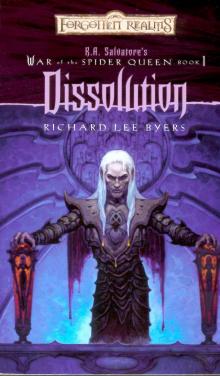 Dissolution
Dissolution Arkham Horror- Ire of the Void
Arkham Horror- Ire of the Void The Haunted Lands: Book II - Undead
The Haunted Lands: Book II - Undead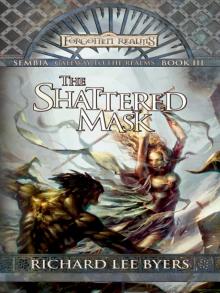 The Shattered Mask
The Shattered Mask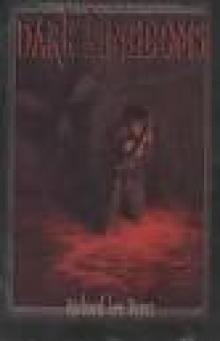 Dark Kingdoms
Dark Kingdoms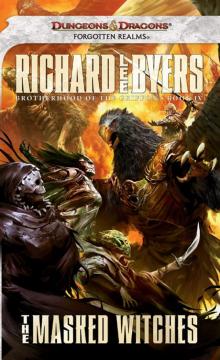 The Masked Witches: Brotherhood of the Griffon, Book IV
The Masked Witches: Brotherhood of the Griffon, Book IV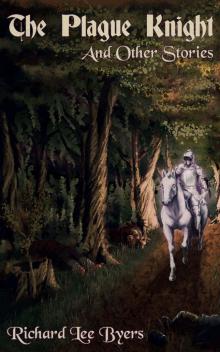 The Plague Knight and Other Stories
The Plague Knight and Other Stories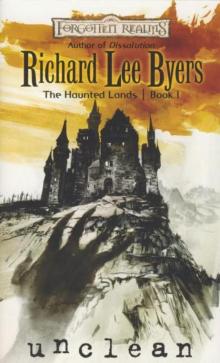 Unclean: The Haunted Lands
Unclean: The Haunted Lands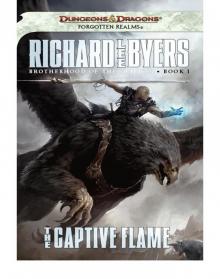 The Captive Flame: Brotherhood of the Griffon • Book 1
The Captive Flame: Brotherhood of the Griffon • Book 1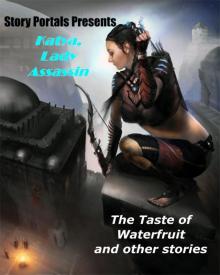 The Taste of Waterfruit and Other Stories (Story Portals)
The Taste of Waterfruit and Other Stories (Story Portals)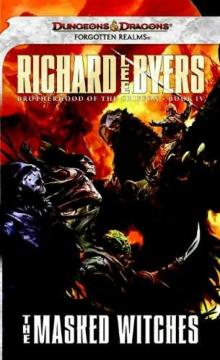 The masked witches botg-4
The masked witches botg-4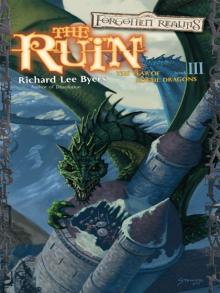 The Ruin
The Ruin The Spectral Blaze botg-3
The Spectral Blaze botg-3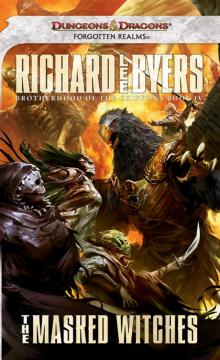 The Masked Witches
The Masked Witches Blind God's bluff bf-1
Blind God's bluff bf-1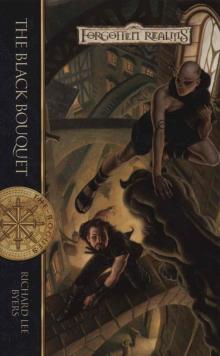 The Black Bouquet r-2
The Black Bouquet r-2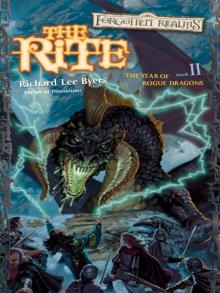 The Rite
The Rite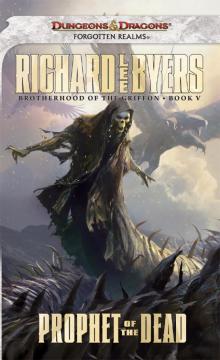 Prophet of the Dead: Forgotten Realms
Prophet of the Dead: Forgotten Realms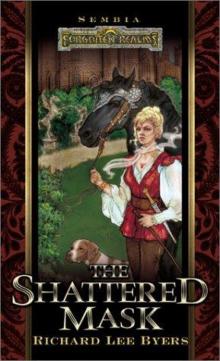 The Shattered Mask s-3
The Shattered Mask s-3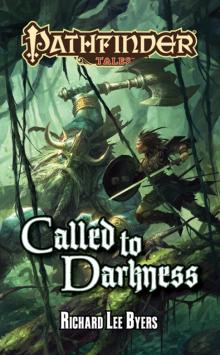 Called to Darkness
Called to Darkness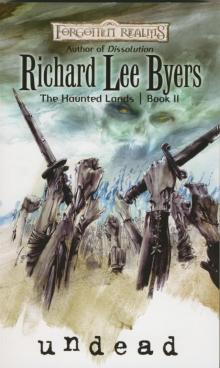 Undead hl-2
Undead hl-2 Blind God's Bluff: A Billy Fox Novel
Blind God's Bluff: A Billy Fox Novel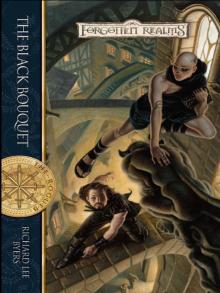 The Black Bouquet
The Black Bouquet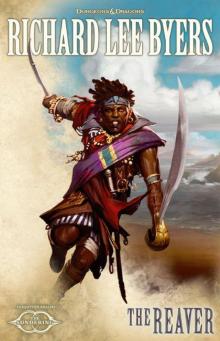 The Reaver
The Reaver The Spectral Blaze: A Forgotten Realms Novel
The Spectral Blaze: A Forgotten Realms Novel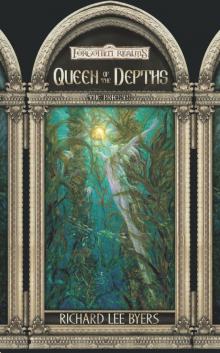 Queen of the Depths
Queen of the Depths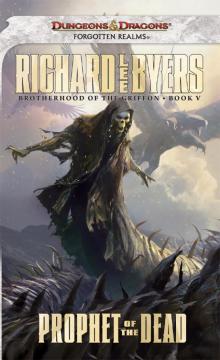 Prophet of the Dead botg-5
Prophet of the Dead botg-5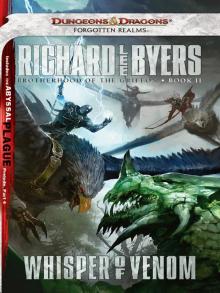 Whisper of Venom: Brotherhood of the Griffon, Book II
Whisper of Venom: Brotherhood of the Griffon, Book II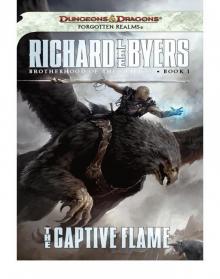 The Captive Flame botg-1
The Captive Flame botg-1 The Haunted Lands: Book III - Unholy
The Haunted Lands: Book III - Unholy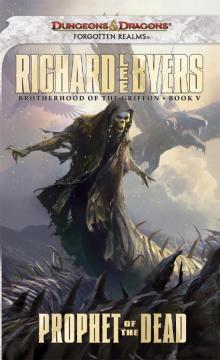 Prophet of the Dead
Prophet of the Dead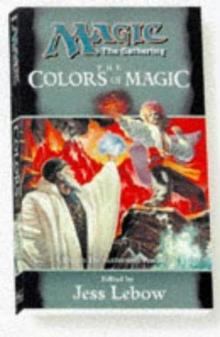 The Colors of Magic Anthology (magic: the gathering)
The Colors of Magic Anthology (magic: the gathering) Unholy hl-3
Unholy hl-3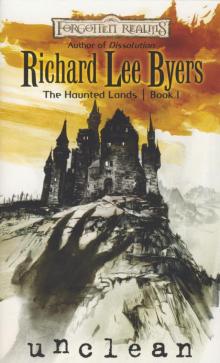 Unclean hl-1
Unclean hl-1 Blind God's Bluff
Blind God's Bluff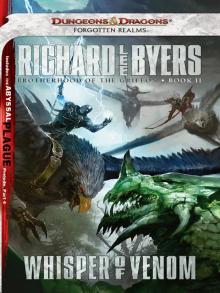 Whisper of Venom botg-2
Whisper of Venom botg-2 The Spectral Blaze
The Spectral Blaze